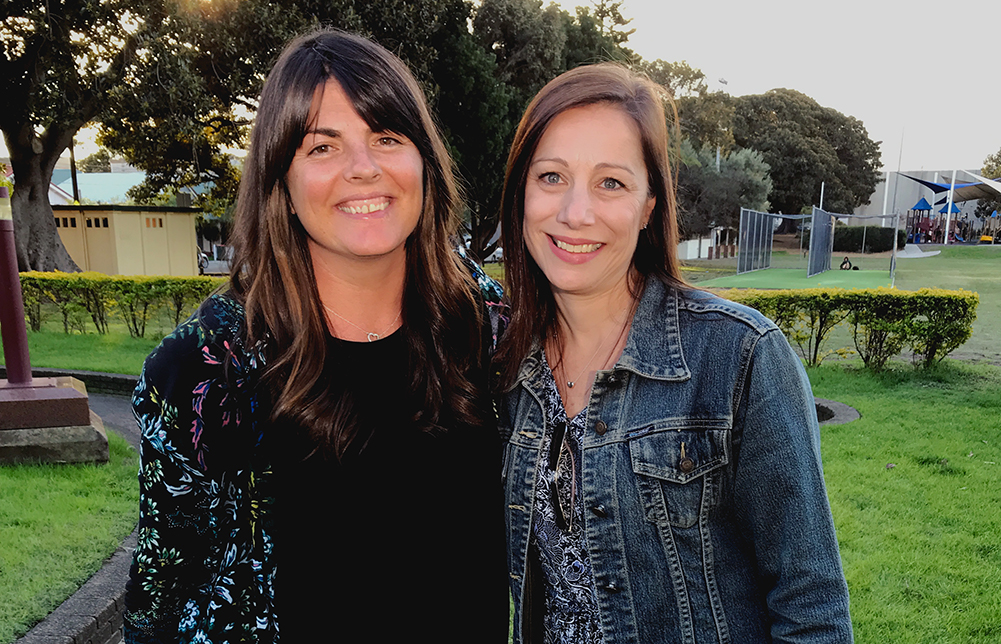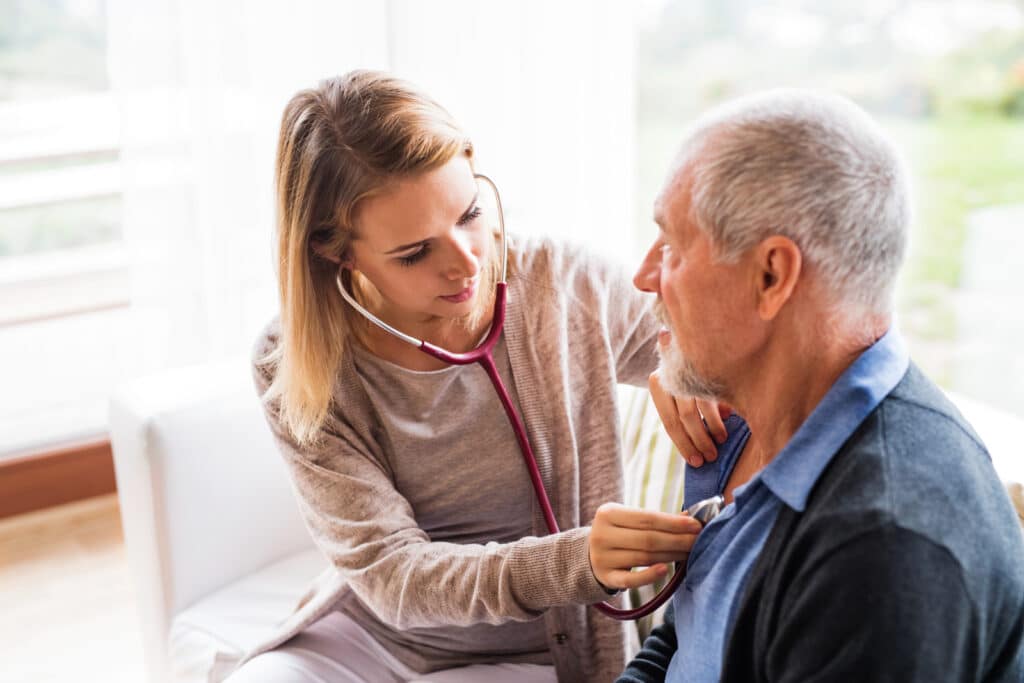A Conversation with Samantha Payne

Sam Payne’s (left) first miscarriage was emotionally traumatic. In the aftermath, she found herself alone reading through horror stories online about never being able to give birth again. She had no idea what to do or how to feel. Consumed by feelings of isolation she found herself lost, empty and for the first time in her life she experienced crippling anxiety and depression. After her second devastating miscarriage, she felt torn in two.
Sam explains, “When you’ve had something taken away from you and the fear of that happening again, nothing’s guaranteed. At the time, as well, my husband and I were going through a journey. We had some other grief issues. We had lost our nephew in a car accident and we also lost my husband’s father who lived with us, and who we were both very close to, so we had a lot going on”.
“After my second loss, I was at a really low point. I felt extremely isolated. I felt like I wasn’t almost allowed to speak about this publicly. I felt that I was being hushed whenever I tried to raise the subject. That didn’t help my style of grief.
“There are charities out there that support stillbirth and that’s fantastic, they are very much needed, but I felt invalidated in my grief after I had my second loss at 10 weeks”. Not feeling her pain was enough to approach one of those charities, Sam went it alone instead.
When Sam and her husband became pregnant for the third time, she recalls agonising over her baby’s fate through the entire pregnancy.
“There was no finding out the gender, no discussing names, no buying baby things, no talking to my growing tummy. There was no way I was tempting fate by believing.
Sam explains, “Every scan was an agonising experience fraught with the fear of hearing those awful words again. I closed my eyes, tears rolling down my cheeks, strangling my husband’s hand, looking at the ceiling until I heard that beautiful heartbeat”.
She got through by setting mini-milestones. 6 week scan – heartbeat, tick. 8 week scan – heartbeat, tick. 10 week NIPT – all clear, tick. 12 week scan – all normal, tick. The entire ordeal placed a great deal of stress on both her and her baby.
Sam shares, “I really, really wish that healthcare professionals had a better understanding of the extra support women who’ve miscarried need. It’s as simple as TLC. I needed a little bit of extra love, care and attention throughout that pregnancy, because I was an absolute nervous wreck and that’s completely understandable. I was entitled to feel that way”.
In spite of her anxiety, Sam did give birth to a healthy child, who will soon be 2 years old. Her child is a rainbow baby, a term for a baby born after a loss.
The inspiration behind The Pink Elephants Support Network
As a result of her miscarriages, Sam realised there was a real need for women in similar situations to have greater support. So, together with her friend, Gabbi, they began researching the issue. Gabbi was similarly interested in the topic, having suffered six miscarriages herself.
Together, they discovered that over 100,000 couples a year in Australia suffer an early pregnancy loss — meaning that 1 out of 4 pregnancies are lost before 12 weeks. Clearly, there were thousands of couples who could benefit from bereavement support.
That opinion was further confirmed when Sam and Gabbi conducted online focus groups to find out what Australian women actually wanted. They were overwhelmed by the positive response — women really wanted a miscarriage support group.
So, Sam and Gabbi co-founded The Pink Elephants Support Network.
The name refers to the way elephants respond when a mother elephant loses her baby. In a beautiful display of caring, the other elephants surround the mother, placing their trunks on her to form a circle of support.
The Pink Elephants Support Network aims to do something similar — not only by helping grieving women — but also by educating her circle of support so loved ones can provide her with the care she needs.
Sam explains, “Traditionally, this is a public health issue that’s received little support or funding. Ironically, although there are 55,000 charities in Australia, Pink Elephants is the only one that specifically helps those who’ve suffered from early pregnancy loss”.
To date, the organisation has supported over 10,000 couples in just 3 years, as of March 2019.
How Pink Elephants helps women who’ve experienced a miscarriage
As a result of their research, Sam and Gabbi discovered that women experience fairly similar journeys after a miscarriage. To support them, they’ve developed a philosophy called ‘Feel, Heal and Beyond’, which incorporates several arms of support both online and offline.
Online support
The initial stages of grief are said to be the ‘Feel’ stage. During this time, women have strong feelings of loss. To support them, Pink Elephants offers a Facebook miscarriage support group where women are supported by other empathetic women who’ve gone through the same thing. This group has bereavement counsellors and trained ambassadors who monitor conversations, so women receive the support they need.
After the ‘Feel’ stage, women move on to the ‘Heal’ stage. Sam explains, “During this period, women are beginning to heal more. Oftentimes, they’re considering whether they want to conceive again. If so, they want to make sure they’re in the best mental and physical health before trying again.”
Sam calls this online support group the preconception group and says, “We bring in holistic health care practitioners — acupuncturists and naturopaths — to speak within that group. We also have a lot of counsellors come in as well and talk about mental health and wellbeing.
“This group offers support and advice for when you’re going through the next stage of ‘Oh, I think I’m going to try and conceive again, but I don’t necessarily want to be in the same space as last time. What can I do this time around?’
“My GP, who was really helpful, said to me after my second loss when I was considering trying again, ‘If you were going to run a marathon, you would put in training, you wouldn’t just run it’.
“It’s the same with a pregnancy and preconception, what that puts on your body. The toll of pregnancy is that you need to be at optimal fitness to go forward with it. It’s that kind of analogy.”
After the ‘Heal’ stage of the journey, there’s the ‘Beyond’ stage. For many women, that means pregnancy. Once they become pregnant, Pink Elephants offers an online group supporting them, so they can deal with the anxiety that is so common among them.
Should a woman experience a loss while they’re in this group, they’ll drop out and instead, join a ‘Feel’ group that can address their very different emotional needs.
Peer-to-peer support
Women will ultimately cycle in and out of these groups, with some of them going on to have rainbow babies. Because they’ve gotten so much out of their experience with Pink Elephants, many of these women express an interest in becoming ambassadors.
Sam shares, “Ambassadors are women who’ve given up a weekend of their time to receive specialised training from a bereavement counsellor. During the training, they learn how to support others through the grief of early pregnancy loss.”
These ambassadors will either monitor online support groups or they can mentor women individually. Just last year, for instance, Pink Elephants piloted a personalised peer support program that offers grieving women six free sessions with an ambassador.
To date, 63 women have been supported through that program, and the organisation is currently looking for the funding to scale it nationally.
Partner support
Sam and Gabbi also recognised that fathers also suffer after a miscarriage. Not just with the loss of the child but with knowing how they can support their partner.
Sam explains, “Men and women grieve differently and this can often lead to miscommunication and further pain.” To prevent this, Pink Elephants also offers partner support.
As well as helping men cope, Sam explains, “Partner support is aimed at men to help them better understand what their partners are going through. It also offers them practical tips on what they can do to support their wives or girlfriends through their period of loss.”
Resources
Pink Elephants also offers a number of free resources on its website. These resources can be downloaded 24/7 and are accessible here. Because these resources are available online, they’re particularly helpful for women in remote areas, for example, who may not always be able to reach a GP or healthcare professional when they need it.
How The Pink Elephants helps GPs
Sam understands the difficult lives GPs lead. She is confident Pink Elephants can help alleviate a little of the burden GPs experience when consoling women who have miscarried, or women who are dealing with infertility challenges, by providing them with a helpful patient resource.
“If anything, we can relieve the burden on GPs”, Sam explains. “We know they’re stressed and they think, ‘Well what do I do, what can I actually do?’ They might refer to SANDS (Stillbirth And Neonatal Death Syndrome charity) and that’s fabulous if it’s a later term loss, but for early pregnancy loss, women deserve and need a very different support service.
“We provide GPs with a reliable referral pathway in that we can take care of the women after they’ve experienced their loss from the emotional perspective. So it takes away some of the work.
“We know that women need more support, we know that GPs are under pressure, they don’t have the time… their appointments now in comparison to what they would have been years ago is insane. We understand that, but we can offer them a clear referral pathway.
“If they have a patient come to them that they unfortunately have to deliver the news of a miscarriage, or a suspected miscarriage, to then that woman needs to walk away with something in her hands.
“One of the biggest things that Gabbi and I identified from the women we surveyed last year is that not only do you have no further follow-up, you actually walk away from that diagnosis with nothing. Not a pamphlet, no information, so women literally turn to Google and that’s not okay because then all they find is horror stories.
“All of our content has been reviewed by medical professionals. Although we don’t offer medical advice — we offer emotional support — we’ve made sure we’ve had medical professionals read and approve all of our resources.”
How GPs can help patients who have miscarried
Sam mentioned four very specific ways GPs can help their patients who’ve suffered a miscarriage. The first is to be sensitive to what the patient’s going through. “They’ve experienced a big loss and that should be acknowledged in a warm and loving tone”, Sam shares.
Next, GPs should be careful about the language they use. “We know that healthcare language is the way that it is for a specific reason but be careful of terminology. I know that when I went through this, all of a sudden I was bombarded with this whole new language.
“As a woman who’s just been told the most devastating news, not only do I not have the ability to actually understand what that language is, but there’s a really negative connotation attached to terms such as D&C or ERPC. Keep it simple,” Sam explains.
“Also, it’s important to avoid rushing through the appointment. When a woman learns devastating news, she needs some time to process that information, rather than being hurried on because there is another patient waiting.
“And finally, aftercare is very important. A GP should ensure that a patient leaves with a clear follow-up plan. That she has somewhere that she can go for the emotional support she not only needs, but deserves”. This is where The Pink Elephants Support Network can help.
A GP resource in the works
The Pink Elephants Support Network is also currently working on a more comprehensive resource for GPs. To create the resource, the organisation is collaborating with the University of Melbourne to create a survey that’s backed by the university’s ethics committee.
Sam explains, “The survey was recently launched with the goal of digging deep to find out more about the type of miscarriage support Australian women are receiving from healthcare professionals.
From that research, we’ll create the Miscarriage and Infertility Guide, which will contain the first clinical guidelines for the treatment of patients through early pregnancy loss and infertility throughout Australia.
“Guidelines currently do not exist which in itself is astounding. There are guidelines for anything across the industry, from breaking your arm to cancer treatment, but there isn’t anything for early pregnancy loss”. The guide is expected to be released in July 2019.
One benefit of the guide is that it will give women a voice to have their stories heard and to translate those stories into meaningful service delivery. As a result, Sam hopes “less women will feel isolated and unsupported through their loss”. And of course, because the guide will be powered by statistical evidence, healthcare professionals can rely on the approach it recommends.
To learn more about The Pink Elephants Support Network’s mission and the resources available, visit www.pinkelephants.org.au.



